Meet the Principal Investigator

Todd Aguilera, M.D., Ph.D.
Todd Aguilera, M.D., Ph.D., is a physician-scientist trained as a radiation oncologist with expertise in molecular engineering, molecular imaging, the tumor microenvironment, and tumor immunology.
Dr. Aguilera completed the Medical Scientist Training Program in 2011 at the University of California San Diego. He obtained his Ph.D. in 2009 in Dr. Roger Y. Tsien's laboratory, which received the 2008 Nobel Prize in Chemistry. His Ph.D. work focused on engineering and validating activatable peptide-based probes to target the tumor microenvironment. Molecules that stemmed from his work are currently being tested in clinical trials for fluorescence-guided surgery of breast cancer.
After an internal medicine internship in San Diego, he joined the Radiation Oncology Residency program at Stanford University. He worked with Dr. Amato Giaccia as a resident and postdoctoral fellow studying factors in the tumor microenvironment that promote immunologic tolerance and developing therapeutic approaches to improve immunotherapy responses in solid tumors. More specifically, he is interested in intrinsic factors that prevent/suppress the anti-tumor immune response after radiation and how these factors can be reversed.
Dr. Aguilera was recruited to the Department of Radiation Oncology at UT Southwestern to establish his research group which will continue to investigate the immune microenvironment and engineer approaches to target cells and molecules that lead to immune privilege. He treats radiation oncology patients with gastrointestinal cancers, is developing laboratory projects in pancreatic cancer, and aims to establish collaborative projects with clinicians and researchers.
Outside of the lab, Dr. Aguilera enjoys spending time snowboarding, surfing (when he can escape back to California for a few days), brewing beer, and spending time with his family. His wife is also on faculty at UTSW in the Division of Neonatology. He has a young son and daughter whom he looks forward to taking to the mountains and ocean.
Current Lab Members
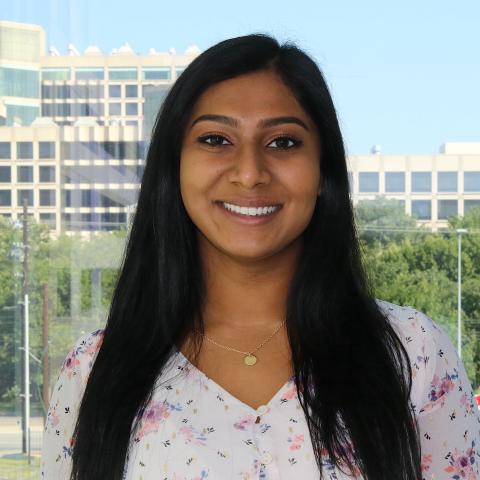
Neha Barrows
Research Assistant I
Neha graduated from Texas Tech in 2020 with a B.S. in biochemistry and a minor in biology. After graduation, she moved to Dallas and joined UT Southwestern as a research technician in the Nijhawan Lab. During her time in the cancer drug discovery lab, she was promoted to research assistant and focused on CRISPR-Cas9 mediated knock-ins in HCT116 to validate novel compound resistance and determine their mechanism of action.
Neha joined the Aguilera Lab in June of 2023. She is very excited to learn a new set of laboratory techniques and contribute to pancreatic cancer clinical trials under the guidance of Dr. Aguilera and his team. In addition to furthering her knowledge in cellular biology and cancer genetics, she is looking forward to learning about the immune response as it relates to cancer treatment.
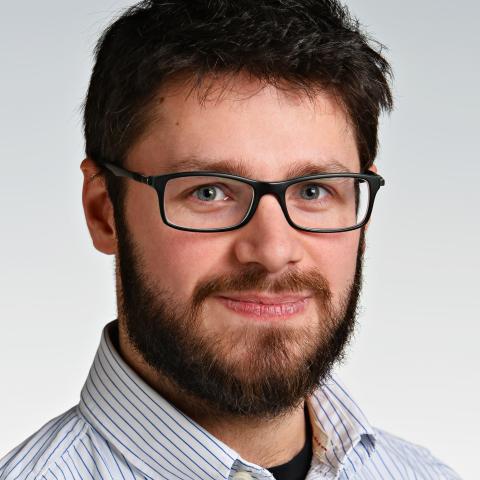
Dr. rer. nat. Sebastian Diegeler
Postdoctoral Researcher
Dr. Diegeler received his M.Sc. in human and molecular biology at Saarland University, Germany, in 2014, and focused his thesis on radiobiological characterization of gastrointestinal cell lines. He was then awarded a Helmholtz SpaceLife Sciences doctoral scholarship at the German Aerospace Center (DLR) in Cologne, Germany, to investigate the role of transcription factor NF-kB in the radiation-induced bystander response. During his doctoral work he was involved in the planning and execution of heavy ion exposure experiments at particle accelerator facilities in Germany (GSI), France (GANIL), and Japan (HIMAC). He also worked on other projects such as the establishment of an ex vivo assay for lymphocytic radiation sensitivity. His doctorate degree in radiation biology was earned from Saarland University in cooperation with DLR in 2020.
Dr. Diegeler joined the Aguilera Lab as a Mary Kay Ash Charitable Foundation funded postdoctoral scholar in December 2020 to investigate the spatial relationships of cellular interactions of the tumor microenvironment with regard to radiation and immune therapy.
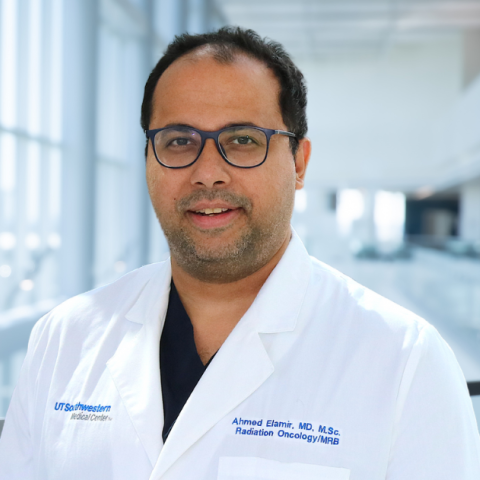
Ahmed Elamir, M.D.
Clinical Fellow
Dr. Elamir received his M.D. from Cairo University, Egypt. Following that, in 2015 he completed a medical radiation oncology residency and a master’s degree (M.Sc.) in clinical oncology with his thesis focused on locally advanced pancreatic cancer outcomes. In early 2018, Dr. Elamir received the AMAAC grant, which funded him to get both proton and pancreatic cancer radiation therapy experience at the University of Heidelberg (DKFZ) Germany.
From August 2018 until February 2021, Dr. Elamir completed a combined gastrointestinal and thoracic clinical research fellowship in the radiation medicine program at Princess Margaret Cancer Centre/University Health Network, University of Toronto, Canada. During his gastrointestinal fellowship, Dr. Elamir gained further clinical and research experiences in pancreatic cancer radiation therapy. Clinically, Dr. Elamir was extensively involved in radiation therapy planning and the treatment of pancreatic cancer, mesothelioma radiation therapy, and lung SBRT. Dr. Elamir was also exposed to the early MR-linac experience at Princess Margaret Cancer Centre. In parallel, Dr. Elamir pursued pancreatic cancer research, exploited a mouse-derived xenograft model to assess re-oxygenation during SBRT in pancreatic cancer, and developed a risk score model to predict loco-regional following upfront surgical resection of pancreatic cancer.
With his background focused on pancreatic cancer radiation therapy, tumor micro-environment, and imaging/hypoxia biomarkers, Dr. Elamir joined the Aguilera Lab with hopes to enhance a collaboration between Princess Margaret Cancer Centre and UT Southwestern; review the UTSW SBRT experience in pancreatic cancer, while helping to build a robust clinical-genomic-imaging pancreatic cancer database; and gain transitional lab skills related to tumor micro-environment; and, ultimately, to develop his career as a pancreatic cancer clinician scientist in radiation oncology.
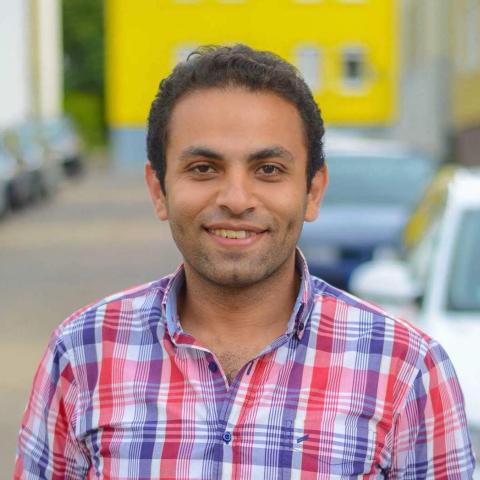
Eslam Elghonaimy, Ph.D.
Research Scientist
Dr. Elghonaimy received his Ph.D. in cell biology and genetics from Cairo University, Egypt in 2016. Following that, he was a postdoctoral fellow at Klinik für Frauenheilkunde und Geburtshilfe, Universitätsklinikum, Münster, Germany. In late 2018, he joined the Aguilera Lab as a postdoc where his interests are centered on the interaction between stromal, tumor, and immune cells that constitute the tumor microenvironment and how this relationship affects tumor initiation and progression.
Dr. Elghonaimy is also interested in sequencing, artificial intelligence technology, integrated computational science, and machine-learning with biological experiments. In addition to his post-doc work, he is a UT Southwestern BICF fellow, which falls under the Department of Bioinformatics and High-Performance Computing Center (BioHPC).
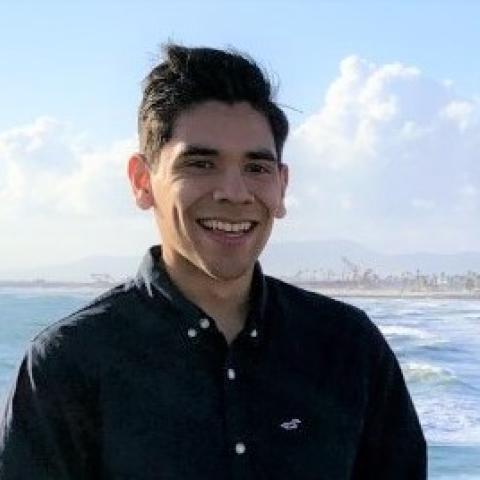
Isaac Gonzalez
Post-Baccalaureate Student
Isaac Gonzalez received his B.S. in biological sciences from California State University San Marcos in 2018. As an undergraduate he worked as a research assistant in the lab of Dr. Julie Jameson studying epidermal gamma delta T cells and was a research technician at a local water chemistry lab.
Isaac joined UT Southwestern's Biomedical Sciences Graduate School in 2019 and the Aguilera Lab in 2020 due to his interest in studying cancer immunotherapy and tumor microenvironment. His current project aims to elucidate inhibitory mechanisms in dendritic cells limiting anti-cancer immunity with the ultimate goal of applying this knowledge to the development of novel cancer therapeutics.
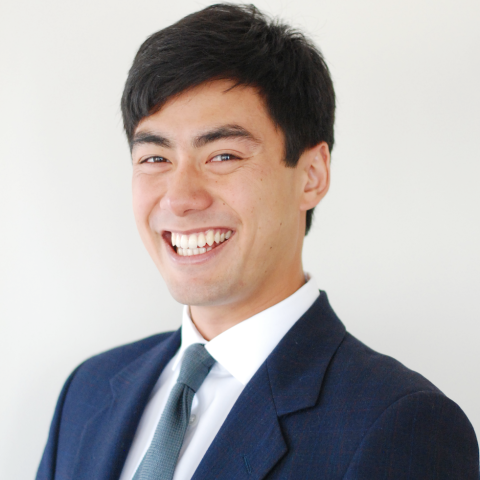
Peter Leung
Perot Family Scholar MSTP Student
Peter received his B.A. in biological sciences from the University of Chicago. As an undergraduate, he worked as a research assistant in Dr. Jun Huang's laboratory investigating peptide-major histocompatibility complex interactions with T cell receptors using super-resolution microscopy.
After a year at the Navy Medical Research Center assisting with research preventing heterotopic ossification in amputees, Peter started medical school at UTSW in 2019 and joined Dr. Aguilera's Lab. After a dedicated research year in the lab as a UTSW Dean's Research Scholar, he then joined the Perot Family Scholars Medical Scientist Training Program in July of 2022. Peter is interested in using phage display screening techniques for discovering functional nanobodies that modulate the immune system as potential anti-cancer immunotherapies.
Isaac Montgomery
Post-Baccalaureate Student
Isaac Montgomery earned a B.A. in university scholars from Baylor University in May 2023. While there, he did research in the lab of Dr. K. Leigh Greathouse where he studied interactions between Fusobacterium nucleatum and Bacteroides fragilis, two important colorectal microenvironmental players. He also tested a novel PI3K inhibitor drug on several breast cancer cell lines.
He first joined the Aguilera Lab in the summer of 2022 with the Amgen Scholars program, then returned in June 2023 for a post-baccalaureate research year through the PB2PhD program. He hopes to enroll in a dual MD/PhD program and continue research in cancer immunology.